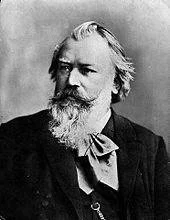Brahms Beautiful Waltz and Intermezzo
Johannes Brahms (1833-1897)
German composer and pianist Johannes Brahms (1833-1897) sometimes is considered one of the “three B’s” of art music: Bach, Beethoven, and Brahms. His exquisitely crafted music nonetheless was considered by some critics “old-fashioned,” especially as compared with the “New German School” music of Liszt, Wagner, and Berlioz. He became embroiled in the “War of the Romantics,” which was a bitter, philosophical, aesthetic dispute between the aforementioned progressives and the conservatives. He was friends with the Robert and Clara Schumann.
While his piano music tends not to be particularly difficult technically (with notable exceptions), it also tends to be emotionally profound.
His beautiful little waltz, Opus 39, No. 15, is simple enough to be played by intermediate piano students, and yet lovely enough to be included on many professional recital programs.
His exuberant intermezzo, Opus 119, No. 3, is C Major at its best.
Subscribe to receive an email notice when I post a new blog article.
Please leave a comment on the original post.
